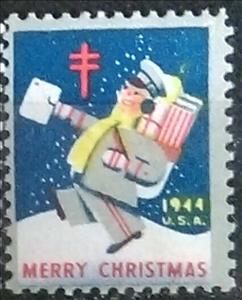Stamp: Tuberculosis Postman (Cinderellas 1944)
Tuberculosis Postman (Cinderellas 1944)
01 January (Cinderellas ) within release U.S.A. goes into circulation Stamp Tuberculosis Postman face value None No Face Value
| Stamp Tuberculosis Postman in catalogues | |
|---|---|
| Colnect codes: | Col: US 1944-01 |
Stamp is vertical format.
Also in the issue U.S.A.:
- Stamp - Tuberculosis Postman face value None;
- Souvenir Sheet - 76th Anniv Union Pacific, Connecting the West With the East face value None;
- Stamp - WW2 propaganda. V for victory remember Pearl Harbour face value None;
- Stamp - Amvets American Veterans Charity. "We remeber" Campaign Amy face value None;
|
Data entry completed
83%
|
|
|---|---|
| Stamp Tuberculosis Postman in digits | |
| Country: | Cinderellas |
| Date: | 1944-01-01 |
| Size: | 21 x 27 |
| Perforation: | 12½ |
| Emission: | Cinderella |
| Format: | Stamp |
| Face Value: | None No Face Value |
Stamp Tuberculosis Postman it reflects the thematic directions:
help, especially in the form of money, given freely to people who are in need, for example because they are ill, poor, or have no home, and organizations that provide this help: She does a lot of work for charity.
Christmas or Christmas Day (Old English: Crīstesmæsse, meaning "Christ's Mass") is an annual festival commemorating the birth of Jesus Christ, observed most commonly on December 25 as a religious and cultural celebration among billions of people around the world. A feast central to the Christian liturgical year, it is prepared for by the season of Advent or the Nativity Fast and initiates the season of Christmastide, which historically in the West lasts twelve days and culminates on Twelfth Night; in some traditions, Christmastide includes an Octave. The traditional Christmas narrative, the Nativity of Jesus, delineated in the New Testament says that Jesus was born in Bethlehem, in accordance with messianic prophecies; when Joseph and Mary arrived in the city, the inn had no room and so they were offered a stable where the Christ Child was soon born, with angels proclaiming this news to shepherds who then disseminated the message furthermore. Christmas Day is a public holiday in many of the world's nations, is celebrated religiously by the vast majority of Christians, as well as culturally by a number of non-Christian people, and is an integral part of the holiday season, while some Christian groups reject the celebration. In several countries, celebrating Christmas Eve on December 24 has the main focus rather than December 25, with gift-giving and sharing a traditional meal with the family.
The mail or post is a system for physically transporting documents and other small packages; or, the postcards, letters, and parcels themselves. A postal service can be private or public, though many governments place restrictions on private systems. Since the mid-19th century national postal systems have generally been established as government monopolies with a fee on the article prepaid. Proof of payment is often in the form of adhesive postage stamps, but postage meters are also used for bulk mailing. Modern private postal systems are typically distinguished from national postal agencies by the names "courier" or "delivery service". Postal authorities often have functions other than transporting letters. In some countries, a postal, telegraph and telephone (PTT) service oversees the postal system, in addition to telephone and telegraph systems. Some countries' postal systems allow for savings accounts and handle applications for passports.



